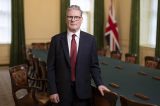
Theresa May, the former Prime Minister of the United Kingdom, expressed her belief that the country would have been better off if Members of Parliament (MPs) had
supported her Brexit deal with the European Union (EU). May's plan faced opposition from both hardline Brexit-supporting MPs and those advocating for remaining in the EU. Her tenure as Prime Minister, which began in 2016 after the Brexit referendum, was marked by challenges in securing parliamentary approval for her withdrawal agreement.
May discussed her perspective in a comprehensive interview on Nick Robinson's Political Thinking podcast, coinciding with the upcoming release of her memoir, "The Abuse of Power." Her tenure was characterized by the complex task of implementing Brexit after a narrow vote of 52% to 48% in favor of leaving the EU.
Throughout her time in office, May's government engaged in prolonged negotiations to formulate a withdrawal agreement outlining the terms of the UK's exit from the EU. She emphasized her commitment to delivering a Brexit deal that addressed the concerns of both sides of the referendum – the 48% who had voted to remain.
However, faced with pressure from within her own party, May encountered significant challenges in garnering parliamentary support for her deal. MPs rejected her negotiated withdrawal agreement with the EU in multiple votes, and efforts to find a compromise with the Labour Party proved unsuccessful.
Despite these setbacks, May maintained that her plan, while not satisfying either side completely, would have provided the UK with a better overall deal. Ultimately, MPs endorsed a deal negotiated by Boris Johnson, who succeeded May as Prime Minister and secured a decisive electoral victory in 2019 by pledging to "get Brexit done."
May contested the characterization of her plan as a "hard" Brexit, emphasizing her efforts to preserve the UK's advantageous trading relationships with the EU. She sought to shift the focus away from the past and toward future opportunities.
The former Prime Minister, who has largely remained out of the public eye since her resignation, delved into various aspects of her tenure during the interview. She touched on significant events, including the Grenfell Tower fire and her interactions with former US President Donald Trump.
May also addressed the portrayal of her emotional resignation statement, highlighting the challenges women in public life face when expressing vulnerability. She noted that emotional displays are often perceived as weakness for women, in contrast to men who are lauded for showcasing their emotions.
Regarding climate change and the UK's commitment to achieving net-zero emissions by 2050, May voiced her support for a pragmatic approach. She emphasized the importance of engaging the public and avoiding drastic measures that could alienate people. May highlighted her belief that addressing climate change should be framed as an opportunity for job creation and economic growth, echoing sentiments expressed by the current Prime Minister, Rishi Sunak.
Throughout the interview, May refrained from criticizing Rishi Sunak and underscored the shared goals of her government's net-zero target and Sunak's approach, emphasizing the need to bring the public along on the journey toward sustainability and economic progress. Photo by Policy Exchange, Wikimedia commons.







































